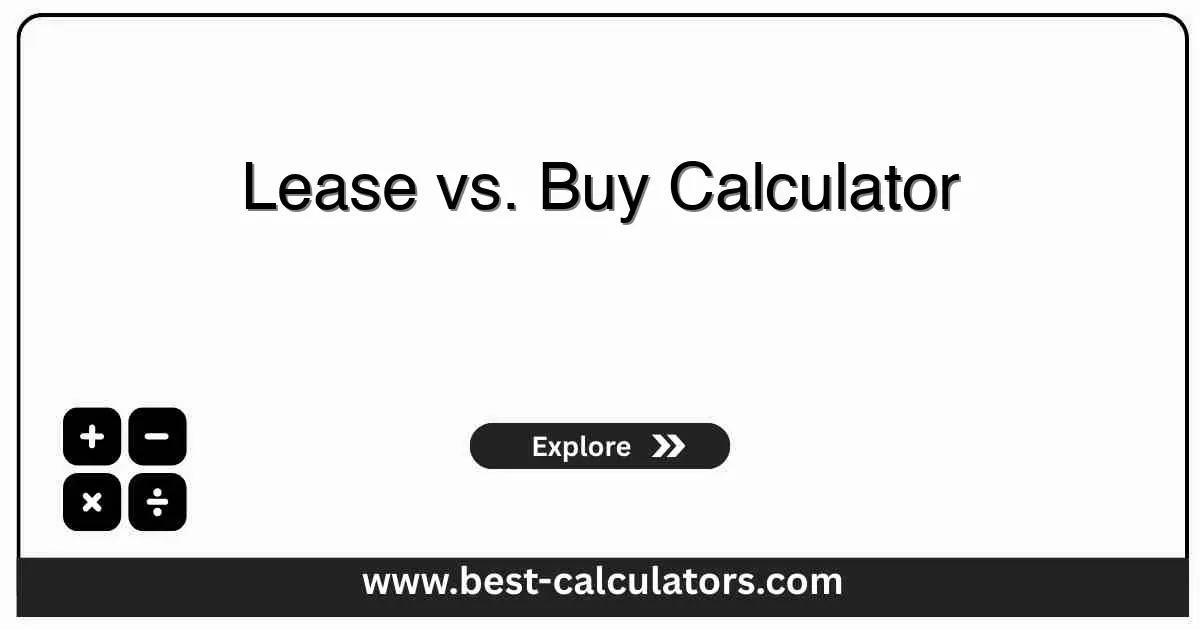Lease vs. Buy Calculator - Compare Car Financing Options
Free lease vs. buy calculator to compare the total costs of leasing versus buying a car. Make informed vehicle financing decisions with detailed cost analysis.
Lease vs. Buy Calculator
Results
What is a Lease vs. Buy Calculator?
A lease vs. buy calculator is a free automotive financial tool that helps you compare the total costs of leasing versus buying a vehicle. It calculates all expenses associated with each option to help you make an informed decision based on your financial situation and driving needs.
This calculator helps with:
- Cost comparison - Total expenses for leasing vs. purchasing
- Financial planning - Understanding long-term vehicle costs
- Decision making - Choosing the best financing option for your situation
- Budgeting - Planning for monthly payments and total expenses
- Value analysis - Evaluating which option provides better value
If you're curious about how much your vehicle might depreciate over time, our Car Depreciation Calculator can provide valuable insights into future resale value.
For those considering electric vehicles, the Electric Vehicle Range Calculator helps you understand real-world driving range based on various factors.
To compare fuel efficiency across different vehicles, try our Fuel Economy Comparison Calculator to make more informed choices about your next car purchase.
How Lease vs. Buy Calculation Works
The calculation compares total costs for both options:
P=Principal, r=Monthly Rate, n=Months
Where:
- Vehicle Price = Purchase price of the vehicle
- Down Payment = Initial payment made upfront
- Term = Lease/buy period in months
- Residual Value = Estimated value at end of term
- Interest Rate = Annual percentage rate for financing
Key Concepts Explained
Depreciation
The decrease in vehicle value over time, which significantly impacts both leasing and buying costs.
Residual Value
The estimated value of a vehicle at the end of a lease or loan term.
Total Cost of Ownership
Includes purchase price, financing costs, depreciation, maintenance, insurance, and taxes.
Equity Building
The value you gain when buying a vehicle that you don't get with leasing.
How to Use This Lease vs. Buy Calculator
Enter Vehicle Price
Input the purchase price of the vehicle you're considering (e.g., $30,000)
Set Down Payment
Enter the amount you plan to pay upfront for both options
Enter Lease Details
Specify lease term and monthly payment amount
Input Buy Details
Enter loan term and interest rate for purchasing
Set Residual Value
Enter the estimated value of the vehicle at the end of the term
Add Mileage
Input your annual mileage to understand wear considerations
Benefits of Using This Calculator
- • Informed Decisions: Make better vehicle financing choices based on real cost comparisons.
- • Financial Planning: Budget for vehicle expenses and understand long-term costs.
- • Value Optimization: Determine which option provides better financial value for your situation.
- • Scenario Analysis: Compare different vehicles, terms, and financing options.
- • Time Saving: Get instant comparisons without manual calculations.
Factors That Affect Your Results
1. Vehicle Depreciation Rate
Different vehicles depreciate at different rates, significantly impacting both lease and buy costs.
2. Interest Rates
Financing rates affect the total cost of buying and may influence lease terms.
3. Mileage
Higher mileage increases wear costs for buying and may result in excess fees for leasing.
4. Maintenance Costs
Leased vehicles typically require less maintenance, while owned vehicles have ongoing maintenance expenses.

Frequently Asked Questions (FAQ)
Q: What is the difference between leasing and buying a car?
A: Leasing is essentially renting a car for a specific period (typically 2-4 years) with monthly payments, after which you return the vehicle. Buying means you purchase the car outright or through financing, becoming the owner and building equity.
Q: When is it better to lease rather than buy?
A: Leasing may be better if you prefer driving newer cars with the latest features, want lower monthly payments, drive moderate miles, and don't mind not owning an asset. It's also suitable for business use where payments may be tax-deductible.
Q: When is it better to buy rather than lease?
A: Buying is better if you want to build equity, plan to keep the car long-term, drive high mileage, want the freedom to modify the vehicle, or prefer the security of ownership. While monthly payments are typically higher, you own the asset at the end.
Q: How does depreciation affect the lease vs. buy decision?
A: Depreciation significantly impacts both options. New cars lose value rapidly in the first few years. In a lease, you're only paying for the depreciation during the lease term. When buying, you absorb the full depreciation but own the asset at the end.
Q: What factors should I consider when deciding between leasing and buying?
A: Key factors include your financial situation, driving habits (mileage), how long you plan to keep the vehicle, preference for new cars, need for ownership equity, maintenance preferences, and potential tax implications.
Q: Are there tax benefits to leasing vs. buying?
A: For business use, both leasing and buying may offer tax deductions. Lease payments are typically fully deductible as a business expense. When buying for business, you can deduct depreciation and interest. For personal use, tax benefits are generally limited.